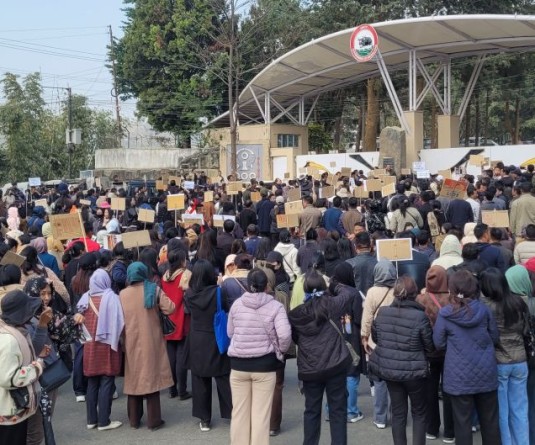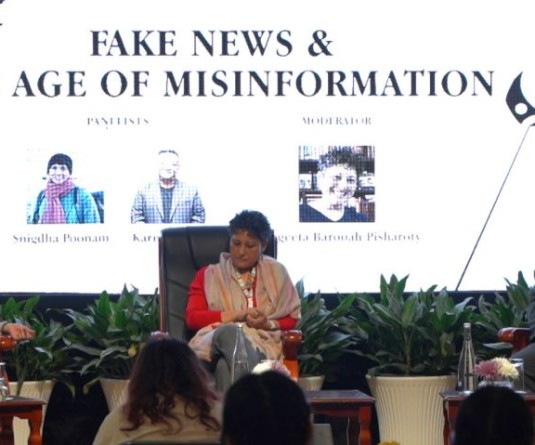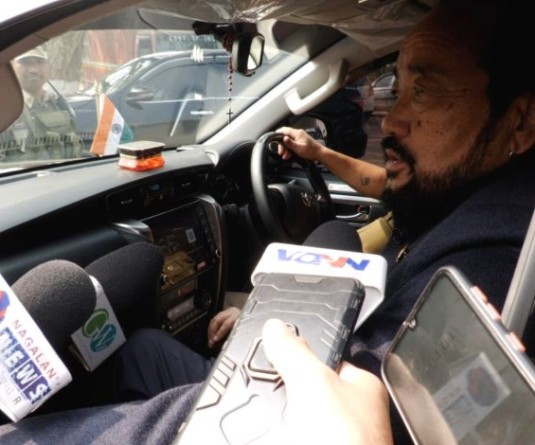Participants during the one-day media workshop on ‘election reporting’ held at Hotel, Vivor, Kohima on February 14. (DIPR Photo)
Morung Express News
Kohima | February 14
“Politics is about people in a democracy and not politicians and journalists, as story tellers must tell the stories of the people and their issues and not the politicians on what they say,” said Editor-in-Chief of East Mojo, Karma Paljor.
While election coverage is a crucial measure of media ethics, he however, pointed out that with election system which varies from place to place, it becomes challenging for the journalist as a community on how to cover the election.
With a career in journalism spanning over two decades, Paljor was speaking as one of the resource persons on ‘elections and media in digital times’ during the one-day media workshop on ‘election reporting’ held at Hotel, Vivor, Kohima on February 14.
The workshop was organised by the Office of the Chief Electoral Officer in collaboration with Directorate of Information & Public Relations (DIPR), Kohima.
Although opinions may be subjective, facts must remain sacrosanct, Paljor said, adding that ethical reporting demands impartiality, a constant pursuit of accuracy, and a refusal to partake in manipulation, deceitful tactics and hate mongering, a strong sense of accountability to maintain an open, peaceful, fair and free electoral process.
Online journalism gets more and more challenging as internet has become infinite today, and social media has transformed election reporting into a kind of non-stop around the clock challenge, he noted.
On the flip side, this, he observed has also resulted in multitude of ‘news actors’ to express their views - those who are not journalists but have the gift of oratory skills, and can sway public opinions.
While social media act as an early warning indicator and a valuable source of news, there’s also the rumour mongering, fake news etc which is diluting the works of the journalists, and cautioned on the need for journalists to fact checking and also giving context to the story
He also advised the state journalists to follow the ‘old ways of journalism’ on understanding the crux of the issue, asking questions, not to be afraid of repeating the basics of difficult issues and exposing political spin among others.
Sunzu Bachaspatimayum, an independent and senior journalist from Manipur speaking on the ‘challenges & opportunities in election coverage’ said the primary obligation of the journalists is to disseminate information and conduct debate for an informed society.
The media, he stated must play a key role, not only as a means of scrutinising government actions, but also ensuring that the electorate has all the necessary information at its disposal to make an informed and democratic choice.
A DIPR report added that media has two aspects to play in a democracy, to inform the public and to act as a watchdog over the government as it is incumbent on the press to impart information and idea on matters of public interest as they also have a right to receive them or the press would not be able to play as vital role of being the public watchdog over the Government.
He also pointed out that freedom of the press gives the public one of the best means of discovering and forming an opinion of the ideas and attitudes of political leaders and also gives the opportunity to reflect and comment on the concerns of public option.
Bachaspatimayum also said that the government may regulate the technical aspects of broadcasting and the media are subject to the law of the land in matters such as defamation or incitement but as a general rule government may not restrict the contents of the media.
Reiterating on free and fair election in Nagaland, CEO V Shashank Shekhar said this can happen only when all the stakeholders come together can ensure the clean election process. While appreciating their contributions of the media, he called upon the journalists to play a constructive role as a medium between the government and the citizens in ensuring informed voting by every citizen.






